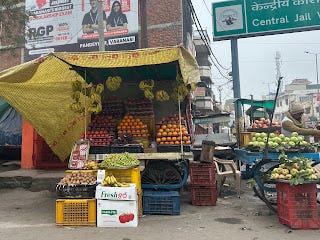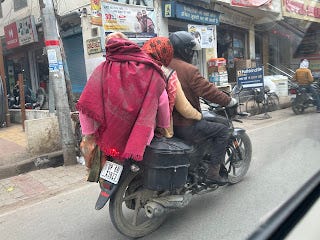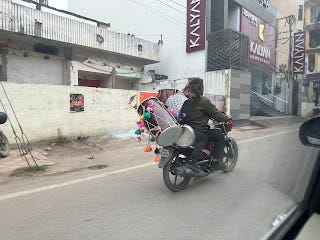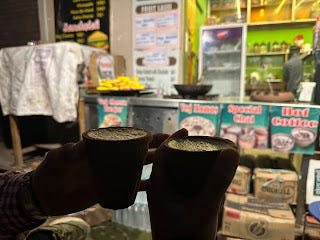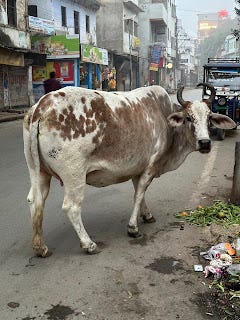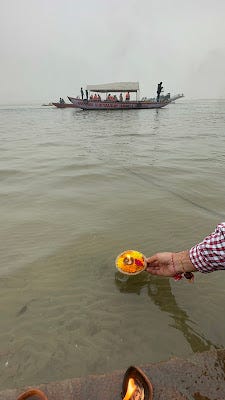I’m jolted awake as the plane touches down. We’re surrounded by trees and plains, nothing in particular to be seen. The clicking of seatbelts ripples through the plane and I’m quick to stand up, stretch, and grab my bag. My friend gestures to me to sit back down. “This is not our stop.”
“What? Stop? We have a layover?”
“This is Karujaho.”
Whether Karujaho is a verb, a noun, slang for “we’ve been hijacked,” I have no idea. People are getting off the plane, and my friend has told me in some strange word that we are remaining on as hostages.
“Karujaho. It’s a city known for… well, don’t look it up right now. It’s known for… umm… temples… don’t worry about it, actually.”
Obviously, I look it up on the spot. Instantly, I see that my friend is too modest to tell me we’ve landed at the site of ancient temples carved with the likeness of the Kama Sutra. I look at the passengers boarding or deplaning in Karujaho with a judging eye, curious what type of person stops off in the middle of nowhere for temple carvings of, well, makin’ whoopee. “So… we have to take a bus from here? Or, we got on the wrong flight?” Still, I am standing with my brows furrowed in confusion.
“No, the plane is picking up passengers here.”
My confusion is not alleviated whatsoever by this explanation. I sit back down, accepting my fate at the hands of the flight crew, who now frantically dash through the cabin. Perhaps I’m still dreaming - I should just go back to sleep. My eyes close.
“Boarding pass.” I am abruptly woken once again.
“What?”
“Boarding pass.”
“But I was already on this plane… I mean, you already saw my boarding pass. It’s in my overhead bag, anyways.” This explanation makes as much sense to him as this stop makes to me. Like a sleepwalker, I stand and search my bag, my confusion elevated high above this flight path. Everyone around me holds their boarding passes up freely, as if a mid-flight security check is perfectly normal. He sees mine and moves on.
I am purely bewildered, but balanced out by my friend pretending to know exactly what is going on. “So this just happens all the time here?”
“No, this has never happened to me before.”
—
At last in Varanasi or Benares or Kashi or whatever the heck it is, we’re plunged into classic, beautiful, orchestral, calamitous North Indian traffic. Corner fruit markets cut into the street and make every turn a close call - one degree in the wrong direction, and perfect, juicy oranges will flood the road, swiftly to be pulped into the dust under wheels of every size.
It's chilly; the Ganga leaves the air damp and carries the Himalayan wind southward. The stone city can’t absorb the bone-cold mist, so the people must. Motorcyclists pass by wrapped in blankets. Co-riders willingly cozy into one another. Humble knit sweaters conceal silken saris. Bold flowers and bright colors wrap from head to hips - scarves and blankets fashioned in direct opposition to the monotones of American winter wear. The heavy gray sky is dotted with a few sad kites, a quiet memory of yesterday’s kite festival.
Depictions of Shiva rise up everywhere. This is his city. His blue body monitors passerby from building walls and car windows. Drums of celebration appear like appendages - hanging off the back of scooters, under the arms of laborers, and in every space fit for a gathering.
--
I need food. And sleep. Jet lag is crashing down upon me, egged on by the pervasive cold. We’re staying at Assi Ghat, which means nothing to me yet. Our hostel is damp, the blankets inadequate. Staff and visitors alike grill my friend on his relationship to the gori. “Hum dosto hain” - We’re friends - repeated ten times throughout the day, and to be repeated in variations a hundred more times in the next two weeks. We drop our bags off in a dark corner behind a squeaky bunk bed and turn right around in search of food. Google Maps sends us around a few corners until we reach a kitchen, open to the street around - smog, animals, trash and all. A narrow hallway leads to a courtyard dining area, birds putzing around under the chairs and tables. Paneer curry - I don’t know which type - lands in front of us, a delicious liberation from the symphony of cold-tired-hungry that has wreaked havoc upon my weary, traveling body. The flavor is enough to forget the street-side kitchen. We come back to the same restaurant five more times in three days, knowing we were lucky to strike gold the first time.
--
I conk out immediately after lunch, sleeping well through the afternoon, until the sun has almost set. The next day, I do the same. So it is by night that I get to know Varanasi. Darkness along the Ganga is never very dark. It is illuminated by the fires of cold sadhus and post-pilgrimage cremations. Nor is quiet along the Ganga actually very quiet. The ghats are ridden with mutts, goats, cows, chickens, beggars, boatsmen, and the children of all of the above. The ghats are stone steps that lead from the city down to the river, making the descent to holy cleansing easy. They run straight down into the water and high above into market streets and temple lines. By day, the shoreline splashes with the bathing of the pious. I have to avert my eyes to pretend I don’t notice lines of soaked men in dripping underwear or women abashedly - but enthusiastically - dunking before they can be caught in various states of undress. But at night, the action stays along the steps. Chai wallas pack up their stalls, one or two holding out patiently for the last of the day’s wanderers. Temple bells ring furiously, along with scattered drums, harmoniums, and dog barks. My friend strikes up conversation with the last of the chai wallas and calls me over tout my gori ki chai (white girl tea) recipe. I recite it in poor Hindi, and she kindly laughs and tells me it’s too complicated - she points to her pot, freshly ablaze for us, and says there is only tea, sugar, milk, and ginger in hers. We take two cups and it is, as expected, perfect.
—
I wake up ravenously hungry the second day in Varanasi, having skipped last night’s dinner that would have fallen at 4 AM in my native Eastern Standard Time. My friend has already been out walking since 5 AM or so. In as many layers as I could fit onto my body, I scuttle downstairs and aim for the nearest chai stall. My friend intercepts me, foiling my usual routine of a solitary tea hour before facing the social world. We walk down a nearly vacant street, still dulled by a sunrise not yet begun.
Four children stop their bickering to stare at the strange duo coming towards them - a desi bhai strolling with a memsahib. Two young women pass by and giggle. In hopes that we’ve arrived before the first pot of the morning is ready, my friend asks the vendor to make our chai less sweet. This, by Indian standards, should still leave about two teaspoons of sugar for each of us. We sip from kulhads, cups of clay or soil that are returned to the earth immediately after use. Kulhads have been deemed ‘dangerous’ for foreigners, but I get more discomfort asking for special treatment than I do from getting sick, so this is only the first of much moulded dirt to touch my lips.
A man strikes up conversation with my friend. I understand every third word or so. Yet, I’m drawn in swiftly and do my best to contribute. He asks why I’m in India, and I give him the short answer - I just like it here. The long answer is translatable to Hindi in words, but perhaps not in concept. The three of us each plead with the vendor to take our money instead of the others’, but I successfully pay for my friend for the first and last time.
—
Before the roads flood with tuk tuks, bicycles, and cars too big to belong anywhere, the early-risers stud the misty grey with orange and yellow clothes like sunshine. In the greatest concentration of beauty I have ever seen in one place, a woman cloaked in deep pink and red sits on a narrow triangle of dirt in an intersection across from the temple. Low-hanging branches graze her head with vines of heart-shaped green leaves. She sells garlands of red and orange flowers, to be purchased and given in veneration to idols and elders. My heart beats faster whenever I pass her, in protest to her secure and disregarded place, squeezed into the seems of this city of holy chaos. Cows run the streets at this hour, rejoicing in this sparse time to roam freely. A mother cow struts swiftly, with intention, as if she’s running late to work. Others sift through curbside trash, often separated between dry waste, thrown away, and wet waste, left out for safe munching. Without humans to give context of the era, Varanasi forces me to remember that these streets have been etched by time since before my country even existed.
—
It’s just before 7 AM, and no food stalls have opened yet. We wander past the entrance to Assi Ghat and beyond, to where the city road of hostels and souvenir vendors quiets into a small town. Animals pass by, a man rides a horse, children walk to school. At last, an idli vendor. I’m reluctant, but it’s the only food we’ve found so far. Despite being a devotee of Indian food, idli - “steamed rice cakes” - never sounded appealing to me, so I’ve so far escaped trying it. The vendor doesn’t make a show of anything, he seems to have a humble personality, perhaps even shy. He slices two cakes into many pieces, hesitating as he adds spicy chutney and looking to my friend as if for confirmation that it’s necessary, then adds diced onions. By the time the bowl is in my hands, it looks more like soup than solid, and I’m wondering how I’m supposed to eat something that’s more condiment than substance. But I take my first bite, and it’s like every tacky 80s love song about someone changing your life. Whether it is my preceding hunger or my dominate frugality falling for the twenty rupee price tag, I love idli. With my whole heart and tongue. And I did need that soup of chutney on top, all of which was absorbed miraculously into the warm white cushions of rice flour below. I ate another. And maybe one more. And two more the next day.
—
Back at Assi Ghat, my friend exchanges a few rupees for a diya - a small bowl of flower petals with a candle in the center for puja, offering. He lights it despite the wind, and sets it afloat on the river. It drifts slowly towards passing rowboats, a speck of light flickering against a wall of grey. The ashen river runs into the sunless sky. As the puja sails gently atop the tide, I wonder whether Varanasi has always been this quiet war between the oppressive winter mist and the brazen colors of celebration.




